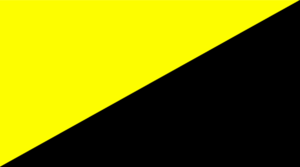Still working to recover. Please don't edit quite yet.
Difference between revisions of "Anarcho-Capitalism"
(→Anarcho-socialist criticism about anarcho-capitalism) |
|||
| Line 10: | Line 10: | ||
== Anarcho-socialist criticism about anarcho-capitalism == | == Anarcho-socialist criticism about anarcho-capitalism == | ||
| − | "Anarcho"-capitalism is a view that departs from anarcho-socialist theory in that it regards only the state, which it defines as a monopoly on force, as unnecessary and harmful to human society. It emerged in the [[1950s]] out of the tradition of [[classical liberalism]] (see [[libertarianism]]), and generally sets itself in contrast to anarchism while attempting to reform the word to mean something new. In its embrace of capitalist economics, "anarcho"-capitalism contradicts classical [[anarchism]], which has historically been ''anti''-capitalist. Social anarchists generally argue that "anarcho"-capitalism isn't a form of [[anarchism]] at all, because it denies a central basis of anarchism in the abolition of hierarchy. Anarcho-socialists generally believe that capitalism cannot exist without enforcement of an economic class system, thus it is impossible to remove coercive hierarchical relationships from a capitalist system. Because it is rooted in liberalism, it believes that individuals should be free to compete with other individuals. [[L. Susan Brown]], an [[anarcha-feminism|anarcha-feminist]], noted that this belief in competition means that individuals are free to take advantage of one another in order to satisfy an ends, rather than granting individuals freedom for the sake of freedom. | + | "Anarcho"-capitalism is a view that departs from anarcho-socialist theory in that it regards only the state, which it defines as a monopoly on force, as unnecessary and harmful to human society. It emerged in the [[1950s]] out of the tradition of [[classical liberalism]] (see [[libertarianism]]), and generally sets itself in contrast to anarchism while attempting to reform the word to mean something new. In its embrace of capitalist economics, "anarcho"-capitalism contradicts classical [[anarchism]], which has historically has been and usually still is ''anti''-capitalist. Social anarchists generally argue that "anarcho"-capitalism isn't a form of [[anarchism]] at all, because it denies a central basis of anarchism in the abolition of hierarchy. Anarcho-socialists generally believe that capitalism cannot exist without enforcement of an economic class system, thus it is impossible to remove coercive hierarchical relationships from a capitalist system. Because it is rooted in liberalism, it believes that individuals should be free to compete with other individuals. [[L. Susan Brown]], an [[anarcha-feminism|anarcha-feminist]], noted that this belief in competition means that individuals are free to take advantage of one another in order to satisfy an ends, rather than granting individuals freedom for the sake of freedom. |
=== Wage labor === | === Wage labor === | ||
Revision as of 21:30, 19 June 2007
| A concurrent version of this article exists: social anarchist perspective |
Anarcho-capitalism is a libertarian view that, while believing in personal freedoms, varies from anarcho-socialism on the matter of property rights. Note that what an anarcho-capitalist considers to be capitalism may be different from more main-stream views on capitalism.
Varying views on intellectual property
While some anarcho-capitalist support intellectual property, as most people would expect capitalists would do, many oppose it, saying that intellectual property infringes in physical property. Jeremy Sapienza, the anarcho-capitalist who founded anti-state.com writes, "Is there nothing more preposterous than equating intellectual property, whatever the hell that is, with real, personal property?"[1]
Anarcho-socialist criticism about anarcho-capitalism
"Anarcho"-capitalism is a view that departs from anarcho-socialist theory in that it regards only the state, which it defines as a monopoly on force, as unnecessary and harmful to human society. It emerged in the 1950s out of the tradition of classical liberalism (see libertarianism), and generally sets itself in contrast to anarchism while attempting to reform the word to mean something new. In its embrace of capitalist economics, "anarcho"-capitalism contradicts classical anarchism, which has historically has been and usually still is anti-capitalist. Social anarchists generally argue that "anarcho"-capitalism isn't a form of anarchism at all, because it denies a central basis of anarchism in the abolition of hierarchy. Anarcho-socialists generally believe that capitalism cannot exist without enforcement of an economic class system, thus it is impossible to remove coercive hierarchical relationships from a capitalist system. Because it is rooted in liberalism, it believes that individuals should be free to compete with other individuals. L. Susan Brown, an anarcha-feminist, noted that this belief in competition means that individuals are free to take advantage of one another in order to satisfy an ends, rather than granting individuals freedom for the sake of freedom.
Wage labor
Anarcho-capitalists think that an employer-employee relationship is basically an elaborate and mutually profitable form of voluntary association. They resent government as a parasite that corrupts, biases, impedes and distorts what would otherwise be peaceful fair and free associations.
Anarcho-capitalists consider that the consent to a contract that each party was free to refuse is evidence and guarantee that the contract is legitimate and beneficial. They claim that any external power capable of preventing such relationship is itself an oppression to be fought.
Anarcho-capitalists argue that, no matter what social organization may or may not exist, social organizations will never eliminate the basic human requirement to work in order to support themselves. Therefore an objection based on a constraint that cannot be overcome is useless to argue about, and not a rational objection at all. They also argue that while someone may not be able to refuse to work in general, one has the largest choice of employers with the diversity of a free market economy, and that what matters is that no given employer/employee contract in particular be coercive.
Anarcho-capitalists are mostly isolated from the larger social anarchist community, which is traditionally anti-capitalist. Anarcho-capitalism is considered a paradox by many anarcho-socialists, who place the theory closer to right-wing libertarianism than to other currents of anarchist thought.
